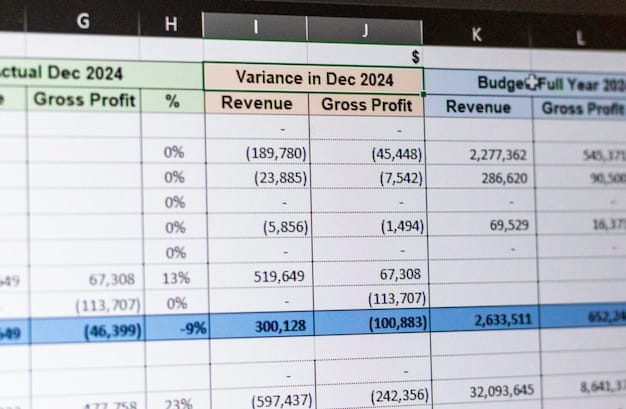Maximize Your Returns: A Guide to Real Estate Investor Tax Benefits

Tax benefits for real estate investors include deductions for mortgage interest, property taxes, depreciation, and operating expenses, allowing them to significantly reduce their tax burden and increase profitability.
Unlocking tax benefits is a crucial strategy for real estate investors looking to maximize their profits. Understanding and utilizing these benefits can significantly reduce your tax burden, freeing up capital for further investments and growth. Let’s explore how to leverage tax benefits for real estate investors effectively.
Understanding Tax Deductions for Real Estate Investments
Real estate investments come with various tax deductions that can significantly reduce your taxable income. These deductions are designed to encourage investment in real estate and can be a powerful tool for building wealth. Let’s explore the key deductions available to real estate investors.
Depreciation Deduction
Depreciation is a crucial tax deduction for real estate investors. It allows you to deduct a portion of the property’s cost each year over its useful life. How does it work?
- Residential rental property: Depreciated over 27.5 years.
- Commercial property: Depreciated over 39 years.
- Land: Land itself is not depreciable.
Properly calculating and claiming depreciation can result in substantial tax savings over the life of your investment.

Beyond standard depreciation, consider cost segregation studies. These studies identify property components that can be depreciated more quickly, potentially leading to larger deductions in the early years of ownership.
Mortgage Interest Deduction
One of the most significant tax benefits for real estate investors is the mortgage interest deduction. This allows you to deduct the interest you pay on your mortgage, reducing your taxable income. Here’s how it works:
Deductible Interest
You can deduct the interest paid on mortgages used to buy, build, or improve your investment property. There are certain limits and requirements so you need to understand the ins and outs.
- Primary Residence vs. Investment Property: Rules differ between personal and investment properties.
- Loan Limits: There may be limits on the amount of mortgage interest you can deduct.
- Documentation: Keep accurate records of mortgage interest payments for tax purposes.
Maximizing your mortgage interest deduction requires understanding the rules and keeping thorough records of your mortgage payments.
Explore strategies to optimize your mortgage interest deductions. For example, you could consider refinancing your mortgage to potentially lower your interest rate and, consequently, your tax liability.
Property Taxes and Insurance Deductions
Besides mortgage interest, property taxes and insurance are also deductible expenses for real estate investors. These deductions can further reduce your tax burden. Let’s take a closer look:
Deducting Property Taxes
Property taxes are generally deductible in the year they are paid. This can provide significant tax relief, especially in areas with high property taxes.
Keep in mind that there may be limits on the amount of state and local taxes (SALT) you can deduct. Stay informed about these limitations to properly plan your tax strategy.

Homeowner’s Insurance Deductions
The insurance premiums you pay to protect your investment property are also deductible. These can include homeowner’s insurance, flood insurance, and other types of coverage.
For example, comprehensive coverage should be considered if you are in an area prone to natural disasters. Document these expenses, to ensure you have the necessary documentation to claim these deductions.
Operating Expenses and Management Fees
Running a rental property involves various operating expenses, such as repairs, maintenance, and utilities. These expenses are also tax-deductible for real estate investors. Also management fees offer a deductions as well.
Deductible Operating Expenses
You can deduct ordinary and necessary expenses related to managing and maintaining your rental property, which can significantly reduce your taxable income.
- Necessary vs. Capital Improvements: Understanding the difference is key.
- Keep Good Records: Accurate record-keeping is essential for claiming these deductions.
- Consult a Tax Professional: For personalized advice, seek guidance from a tax advisor.
Take advantage of these deductions to minimize your tax liability and maximize your profitability.
Understanding what qualifies as an operating expense is crucial. For example, minor repairs, such as fixing a leaky faucet, are deductible operating expenses. However, major renovations that add value to the property are considered capital improvements and must be depreciated over time.
Tax Benefits of a 1031 Exchange
A 1031 exchange is a powerful tool that allows real estate investors to defer capital gains taxes when selling an investment property and reinvesting the proceeds in another similar property. By utilizing this exchange, you do not have to pay capital gain taxes.
Understanding the 1031 Exchange
A 1031 exchange allows you to defer capital gains taxes when selling one investment property and reinvesting the proceeds into another like-kind property. This can be a valuable tool for growing your real estate portfolio without incurring immediate tax liabilities.
- “Like-Kind” Property: The exchanged properties must be of like-kind.
- Timing Rules: Strict deadlines must be met for identifying and acquiring the replacement property.
- Qualified Intermediary: An intermediary is typically required to facilitate the exchange.
A 1031 exchange is a powerful strategy, but it requires strict adherence to IRS rules and careful planning.
Consider the long-term benefits of deferring capital gains taxes through a 1031 exchange. By delaying these taxes, you can reinvest more capital and potentially generate higher returns over time.
Navigating Capital Gains Taxes in Real Estate
When you sell a real estate investment for a profit, you’re typically subject to capital gains taxes and will have to pay capital gains taxes. However, understanding the rules and strategies around capital gains can help minimize your tax liability. Know what you have to do.
Understanding Capital Gains
Capital gains taxes are levied on the profit from the sale of an asset, including real estate. The tax rate depends on how long you held the property and your income level.
Strategies to minimize capital gains taxes include holding the property for longer than one year to qualify for lower long-term capital gains rates and offsetting gains with losses from other investments.
Capital gains taxes are an important consideration for real estate investors. Proper planning and understanding of tax laws can help minimize their impact on your returns.
| Key Point | Brief Description |
|---|---|
| 🏡 Depreciation | Deduct a portion of property cost annually. |
| 💰 Mortgage Interest | Deduct interest paid on mortgages. |
| 🧾 Property Taxes | Deduct property taxes paid annually. |
| 🔄 1031 Exchange | Defer capital gains by reinvesting in like-kind property. |
Frequently Asked Questions
▼
Key benefits include deductions for depreciation, mortgage interest, property taxes, operating expenses, and the option to defer capital gains taxes through a 1031 exchange.
▼
Residential rental properties are depreciated over 27.5 years, while commercial properties are depreciated over 39 years. This means you deduct a portion of the property’s cost each year.
▼
A 1031 exchange allows investors to defer capital gains taxes when selling an investment property and reinvesting the proceeds into a like-kind property. It aids portfolio growth.
▼
Yes, ordinary and necessary repairs to maintain the rental property are tax deductible as operating expenses in the year they are incurred.
▼
Yes, insurance premiums paid to protect your investment property, such as homeowner’s insurance or flood insurance, are deductible expenses.
Conclusion
Understanding and utilizing the numerous **tax benefits for real estate investors** is crucial for reducing your tax burden and increasing your profits. This includes deductions for mortgage interest, depreciation, property taxes, and operating expenses, as well as strategies like the 1031 exchange. With careful planning and professional guidance, you can optimize your tax strategy and maximize your returns in the real estate market.





